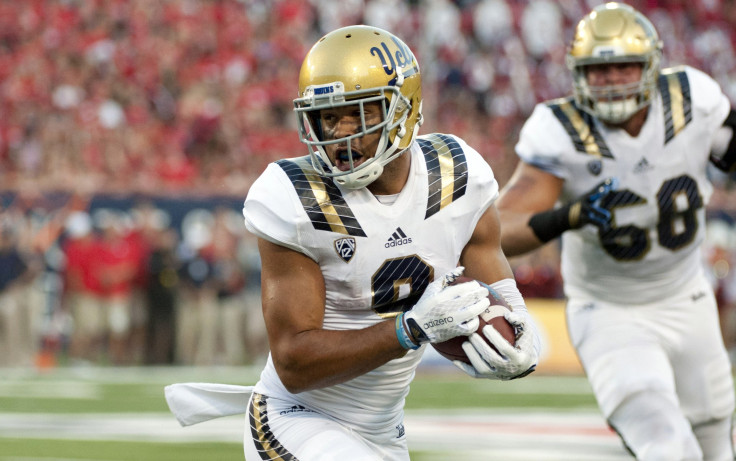NCAA O'Bannon Antitrust Ruling Explained: Decision Opens Door For Athlete Compensation

A U.S. federal appeals court ruling on former college basketball star Ed O’Bannon’s antitrust lawsuit this week is largely being hailed as a victory for the NCAA. But a crucial element of the court’s decision may have done damage to one of the association's favorite legal defenses and opened the door for college athletes to receive compensation for their labor on the playing field.
The 9th Circuit Court of Appeals upheld U.S. District Court Judge Claudia Wilken's August 2014 decision that current NCAA rules violate antitrust laws. NCAA restrictions on compensation are no longer exempt from antitrust law – collegiate officials must prove in court that every measure is being implemented in the interest of “amateurism.” That determination could prove crucial when future plaintiffs pursue a share of NCAA revenue, which surpassed $3 billion for college football alone in 2013.
“This is a win for the students as well, and the reason is they can challenge NCAA amateur restrictions in court,” said Michael Carrier, a professor at Rutgers Law School in New Jersey who specializes in antitrust law.
Appeals court ruling is both win and loss for NCAA in the O’Bannon case http://t.co/GsIFkpdC0X pic.twitter.com/NBpa8nLe3c
— Post Sports (@PostSports) September 30, 2015From the start, most legal experts expressed doubt that the entirety of Wilken's favorable ruling for the plaintiffs would hold up under appeal. Providing full cost of attendance, which is more expensive than basic tuition, was seen as a realistic option, and several major universities began to offer that benefit to student-athletes months before the appeals court’s mandate this week. Athletic scholarship coverage has grown by about $160 million in the NCAA’s “Power Five” conferences, USA Today reported.
But Wilken’s decision to require $5,000 in deferred athlete compensation was seen as arbitrary, with little basis in the law. Judge Jay Bybee, who was part of the three-judge appeals court panel, made that clear in his written opinion.
“The difference between offering student-athletes education-related compensation and offering them cash sums untethered to educational expenses is not minor; it is a quantum leap,” Bybee wrote. “Once that line is crossed, we see no basis for returning to a rule of amateurism and no defined stopping point.”
The majority decision also upheld a crucial element of the NCAA’s long-term legal defense – that the NCAA’s financial success is due in large part to the amateur status of its athletes.
“Both we and the district court agree that the NCAA’s amateurism rule has procompetitive benefits. But in finding that paying students cash compensation would promote amateurism as effectively as not paying them, the district court ignored that not paying student-athletes is precisely what makes them amateurs,” Bybee wrote.
But the majority decision’s comments on the NCAA’s favorite Supreme Court case provided student-athletes with a much-needed silver lining. The defendants cited the 1984 ruling, which the Supreme Court made in response to NCAA-imposed restrictions on college football television broadcasts, throughout the O’Bannon appeal. At the time, former Justice John Paul Stevens wrote student-athletes should remain unpaid to preserve the NCAA’s “revered tradition of amateurism.” In the O'Bannon case, the NCAA pointed to the fact that amateurism exempted the NCAA from antitrust law, with specific reference to the 1984 ruling that “athletes must not be paid.”
Initial NCAA statement regarding O'Bannon decision: pic.twitter.com/qk9hc8OBqn
— NCAA (@NCAA) September 30, 2015While the appeals court’s majority opinion agreed with the notion that NCAA amateurism is crucial to profitability, it rejected the assertion that amateurism was a foolproof shield against antitrust claims. Student-athletes can now challenge individual NCAA restrictions on compensation, and plaintiffs can pursue other avenues other than Wilken’s $5,000 deferred compensation plan. For example, Michael Hausfeld, who represented O’Bannon in the case, told ESPN that student-athletes could be entitled to part of the NCAA’s massive television broadcast revenue.
“It’s right that amateurism was upheld – it wasn’t completely struck down as a frivolous justification that the NCAA can never rely on,” said Carrier, the Rutgers law professor. “But on the other hand, it was not the strongest justification in the world and it was not strong enough to put off this remedy on the cost of attendance. Amateurism was not the really strong shield that the NCAA has used for a decade.”
Not everyone is convinced the appeals court’s ruling dealt the NCAA’s amateurism shield a significant blow. The majority decision affirmed the basic tenant that NCAA student-athletes should remain unpaid, so the NCAA is only vulnerable to antitrust cases that do not directly affect student-athletes, said Stephen Ross, director of Penn State University’s Institute for Sports Law, Policy and Research.
“They’re going to have to defend everything in court, but they’re just going to win on any challenge to amateurism if the majority decision is sustained,” Ross said.
Several factors could weaken or even undo the 9th Circuit Court’s ruling, though. Judge Bybee has a dubious reputation in legal circles – he is perhaps best known for authorizing the legal doctrine under which inmates at U.S. military bases in Guantanamo Bay and Iraq were subjected to waterboarding and other questionable interrogation techniques. And the 9th Circuit Court’s ruling wasn’t unanimous, which could embolden other antitrust plaintiffs to seek a more favorable decision in a different court. A contradictory decision in another appeals court would force the United States’ highest court to get involved.
“People are going to file lawsuits in other courts and they’re just going to argue to the other courts that this decision is completely unsupported and unjustifiable and try to persuade a federal judge somewhere else, outside the 9th Circuit, to take another approach,” Ross said. “If they succeed in that way, eventually the Supreme Court’s going to have to decide the case.”
© Copyright IBTimes 2024. All rights reserved.












